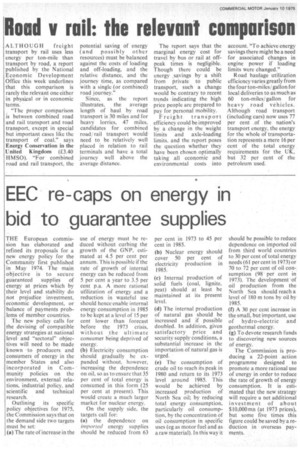EEC re-caps on energy in bid to guarantee supplies
Page 22

If you've noticed an error in this article please click here to report it so we can fix it.
THE European commission has elaborated and refined its proposals for a new energy policy for the Community first published in May 1974. The main objective is to secure guaranteed supplies of energy at prices which by their level and stability do not prejudice investment, economic development, or balance of payments problems of member countries.
The new policy calls for the devising of compatible energy strategies at national level and "sectoral" objectives will need to be made known • to producers and consumers of energy in the member States and also incorporated in Community policies on the environment, external relations, industrial policy, and scientific and technical research.
Outlining its specific policy objectives for 1975, the Commission says that on the demand side two targets must be set: (a) The rate of increase in the use of energy must he reduced without curbing the growth of the GNP, estimated at 4.5 per cent per annum. This is possible if the rate of growth of internal energy can be reduced from 5 per cent a year to 3.5 per cent p.a. A more rational utilization of energy and a reduction in wasteful use should hence enable internal energy consumption in 1985 to be kept at a level of 15 per cent lower, than forecast before the 1973 crisis, without the ultimate consumer being deprived of energy.
(b) Electricity consumption should gradually be expanded without, however, increasing the dependence on oil, so as to ensure that 35 per cent of total energy is consumed in this form (25 per cent at present). This would create a much larger market for nuclear energy.
On the supply side, the targets call for: (a) the dependence on imported energy supplies should be reduced from 63 per cent in 1973 to 45 per cent in 1985.
(h) Nuclear energy should cover 50 per cent of electricity production in 1985.
(c) Internal production of solid fuels (coal, lignite, peat) should at least be maintained at its present level.
(d) The internal production of natural gas should be increased and if possible doubled. In addition, given satisfactory price and security supply conditions, a substantial increase in the importation of natural gas is urged.
(e) The consumption of crude oil to reach its peak in 1980 and return to its 1973 level around 1985. This would be achieved by increased production of North Sea oil; by reducing total energy consumption, particularly oil consumption, by the concentration of oil consumption in specific uses (eg as motor fuel and as a raw material). In this way it should be possible to reduce dependence on imported oil from third world countries to 30 per cent of total energy needs (61 per cent in 1973) or 70 to 72 per cent of oil consumption (98 pet cent in 1973). The development of oil production from the North Sea • should reach a level of 180 m tons by oil by 1985.
(f) A 30 per cent increase in the small, but important, use of hydro-electric and geothermal energy.
(g) To devote research funds to discovering new sources of energy.
The Commission is producing a 22-point action programme designed to promote a more rational use of energy in order to reduce the rate of growth of energy consumption. It is estimated that the new strategy will require a net additional investment of about $10,000 mn (at 1973 prices), but some five times this figure could be saved by a reduction in overseas payments.




































































































